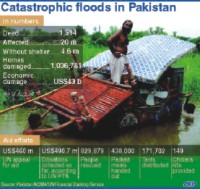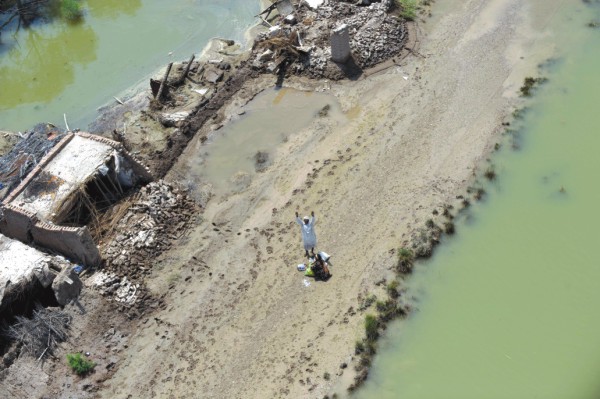|
Neighbours
Not Just a Natural Disaster
KAMILA SHAMSIE
 First came the Taliban. Then the army. And now the floods. The people of the Swat valley synonymous with beauty and peace just a few years ago have cause to wonder if they are the most benighted people in the world. And then the rains came. First came the Taliban. Then the army. And now the floods. The people of the Swat valley synonymous with beauty and peace just a few years ago have cause to wonder if they are the most benighted people in the world. And then the rains came.
At the last count, 54 villages have been swept away entirely. It is almost beyond emotional comprehension the idea that the homes you were forced out of by violence and terror a year or more earlier, and to which you have only recently returned, are now gone completely, no trace remaining. And the floods are continuing the death toll is already nearly 1,500, and more rains are expected. There is no province of Pakistan that is expected to remain unaffected; a grim irony given how rare it is for any event to draw together all of Pakistan's feuding parties.
It is possible to regard the floods as separate from the first two horsemen of the Apocalypse the Taliban and the army. Floods are, after all, "natural disasters" or "acts of God" (take your pick in Pakistan, most people will choose the latter). No one is culpable, no one could have prevented it. The truth is, the death toll could have been much lower, assistance much more quickly and efficiently at hand. Instead, report after report talks of the inadequacy of the state's response to the crisis. This is made more maddening by the fact that much of the flooding took place in parts of the country that were already a humanitarian disaster zone.
The Swat Valley should have been crowded by institutions of state helping rehabilitate those returning to their homes, and switching focus to flood relief should have been a fairly speedy process. After all, NGOs such as Oxfam and its local partners in Swat have made precisely that switch. The fact that a pre-existing disaster meant NGOs were on the ground and able to respond swiftly to the flooding is the thinnest of silver linings. But, while assistance from the state has not been wholly absent in the Swat valley in the last year, many of the proposed aid projects are yet to materialise and assistance has been slowed down by a tug of war between the military and civilian authorities for who has control of the rehabilitation.

But it is not only the matter of response but also that of cause, which implicates the state of Pakistan. In the last few years, environmental groups, activists and journalists have talked repeatedly of the power of the timber mafia, which has a particularly strong hold on the areas now affected by flooding. One of the most powerful and ruthless organisations within Pakistan, the timber mafia engages in illegal logging, which is estimated to be worth billions of rupees. The group's connection to politicians at the local and federal level has been commented on in the media for years. The constant warnings about the timber mafia almost always include mention of the increased susceptibility of de-forested regions to flooding, landslides and soil erosion. But, in the way that horror tends to pile on horror in Pakistan, not only has the flooding been intense in areas where the timber mafia is active, but the felled trees, hidden in ravines prior to smuggling them onwards, have caused havoc. Dislodged by torrents of water, they have swept away bridges and people and anything else in their path.
There has been some suggestion that the high volume of timber transported along the rivers has been a factor in the weakening of the dams and retaining walls that are supposed to protect the land from flooding but have proved unequal to the task. Their failure to function has also brought up comparisons to the poor construction that resulted in collapsed government schools during the 2005 earthquake; then, blame landed on corrupt practices and lack of oversight by the authorities in the allocation of construction contracts.
That the timber mafia reportedly gave active support to the Pakistan Taliban when they controlled Swat seems to have done nothing to diminish their influence with the state. Corruption transcends political difference. Where action is taken against the timber mafia it is often in the form of local villagers coming out to defend their trees. Pakistan's citizens, time and again, find it falls to them to fill in the vacuum where there should be a state.
So it's fitting in a perverse way that while the number of those affected by the flood climbs to 3 million, Karachi burns in retaliatory violence following a political assassination on 2 August, and families wait for the DNA identification of the victims of the 28 July air-crash near Islamabad, Pakistan's president is on his grand tour first France, now the UK. Some in Pakistan ask why he is so far away in a time of disaster. But there is no place further away from the rest of Pakistan than the self-enclosed and self-serving world of government-dominated Islamabad. No doubt, during President Zardari's visit to the UK, pundits will weigh in on the crises in Pakistan and the term "failed state" will be bandied around, either in defence or criticism of David Cameron's "clear and frank" comments about terrorism. But in Pakistan, amid floods and ashes and yet more funerals, people live with the crushing awareness of a somewhat different formulation not the state that has failed, but the state that fails its citizens.
Copyright
(R) thedailystar.net 2010 |
| |
